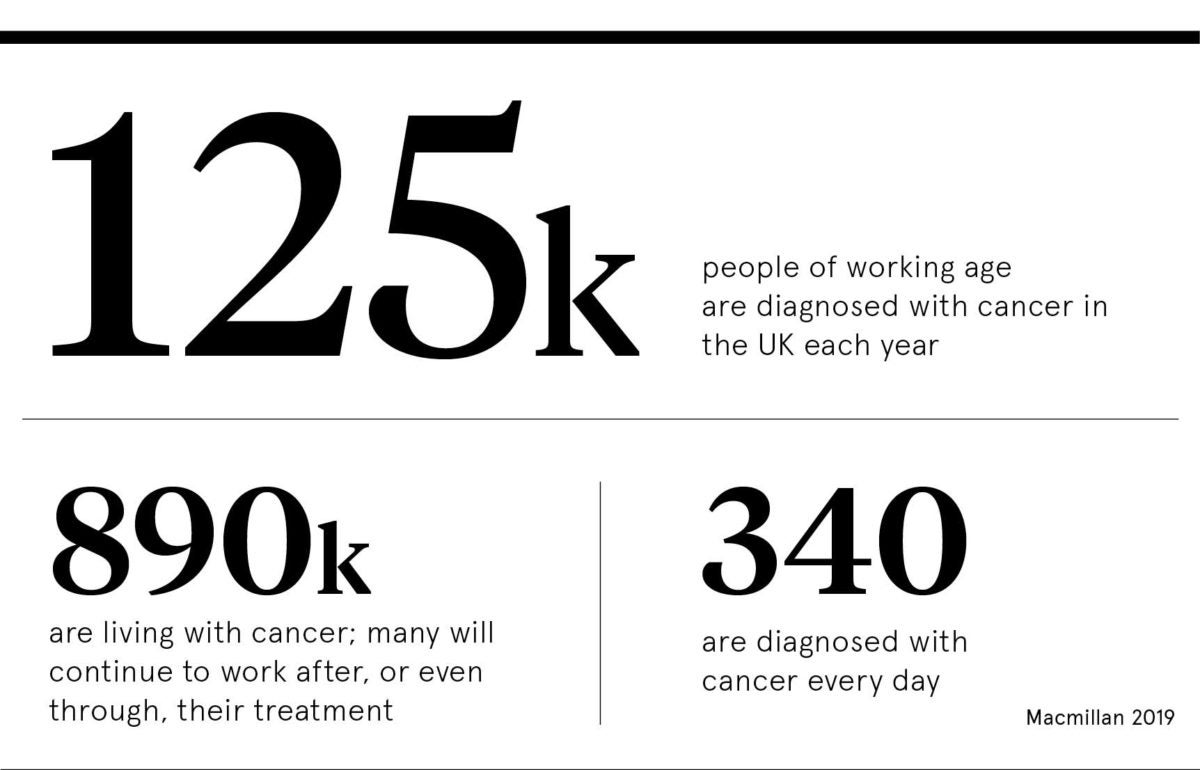It’s one thing to announce to your family and friends, “I have cancer”; it’s another to stand up in an open-plan office and tell your colleagues and bosses that you have cancer at work. Some people worry their employer will discriminate against them or even sack them, others are concerned cancer will damage their career.
“Cancer isn’t fair, but your boss has to be,” says Liz Egan, programme manager at Macmillan Cancer Support. “We’re all guilty of certain perceptions. The fact is there is still a lot of stigma attached to cancer; it’s why employees face a lot of issues when it comes to workplace attitudes.”
Laws protecting those with cancer at work
This is also of mounting concern as we live and work longer. There are now more than 890,000 people living with cancer in the UK workforce, set to rise to almost 1.2 million by 2030, according to the charity. Survival rates have climbed over recent decades, but a record number are suffering discrimination at work, according to a YouGov poll last year, with one in five employees facing issues.
“We’ve heard of bullying, people losing their jobs and harassment at work because of peoples’ cancer diagnoses, even though it’s against the law. Only half the workers we surveyed realise they actually have any rights at all,” says Ms Egan. 
Under the Equality Act 2010, employers have a legal duty to make “reasonable adjustments” to help those diagnosed with cancer remain in or return to work when they’re able. Failure to do so is discrimination. Those who have cancer are technically classed as disabled in the eyes of the law. It is, therefore, illegal to treat an employee less favourably because they have this condition.
But what is reasonable for one employer or employee may not be for another. Reasonable adjustments can also apply for someone’s entire working lifetime; there is no time limit.
“An open dialogue with an employer throughout the different stages of the employee’s diagnosis, treatment and post-treatment is essential. An employer is not expected to make reasonable adjustments if they are not aware of the diagnosis and if they could not reasonably have been expected to know of it,” says Stephen Wallwork, vocational rehabilitation manager at Maggie’s Manchester.
Dealing with a rainbow of experiences
With roughly 200 different types of cancer, myriad treatments, and countless attitudes and abilities in terms of whether people need, want or are able to work, the variables seem endless. This is certainly not a cookie-cutter disease. How to make support bespoke for people with cancer at work is a big question, which is why Macmillan has an eight-person telephone support line.
“People with cancer don’t always know at the outset what their diagnosis and treatment will mean for them, and they don’t know what they should ask for in the way of support,” says Barbara Wilson, founder of Working with Cancer.
“Good communication is absolutely vital. It’s an employer’s job to take the time to understand each individual’s situation. Sadly, an inclusive and supportive working environment is still a work in progress and many line managers have never managed anyone with cancer.”
There are now a lot of resources online via Macmillan Cancer Support and the charity runs workshops to help human resources and line managers support colleagues with cancer at work, so far training 13,000 employers in the process. “Assistance for cancer patients also works best when it’s driven from the top, the CEO, and where executive teams make this a priority, offering flexible policies that are supportive not punitive,” says Ms Egan.
There are other schemes to help support cancer in the workplace. Some companies have their own networks or cancer buddies, where staff are trained to assist employees through their treatment; others have detailed intranet systems offering full support. Flexible hours are also crucial for cancer patients.
It is important to consider cancer and other conditions in the light of a wider diversity and inclusion agenda.
“We often think about this in terms of gender, race or socio-economic background. Neurodiversity is a developing area for many companies that value different ideas, such as people who have diagnosed conditions such as autism. The experience of having cancer should also be in this mix,” says Dr Andrew Parsons from the Fountain Centre, a cancer charity.
Cancer is still a workplace challenge
In spite of raised levels of awareness and support, there are still many challenges, especially for those in physical or manual labour. “We expect large companies to do more, that’s for sure. Yes, small to medium enterprises find cancer challenging, but they tend to do it well because smaller companies act more like families with the support they provide,” says Ms Egan.
One group that is often forgotten in this discussion is carers of cancer patients. There are almost 1.5 million of them in the UK. A good number of these have full-time jobs. Under the Equalities Act, they also cannot be discriminated against by their employer. If they have to look after a loved one with cancer, they are protected in law, by association.
“This group has the right to request flexible working. But some employers provide better rights than others,” says Ms Egan. “For many carers, their lives can be very stressful, many fall out of work because they cannot manage employment and caring for loved ones. It’s a hidden issue, and it’s not discussed much, and can be a real struggle for some.”
Interestingly, during this highly stressful time, especially at home, the office comes into its own for cancer patients, providing normality and routine. That pat on the back from the boss, the laugh at the water cooler with colleagues can make all the difference. Those workplaces that realise this, as cancer numbers grow in the future, will thrive.
Laws protecting those with cancer at work


